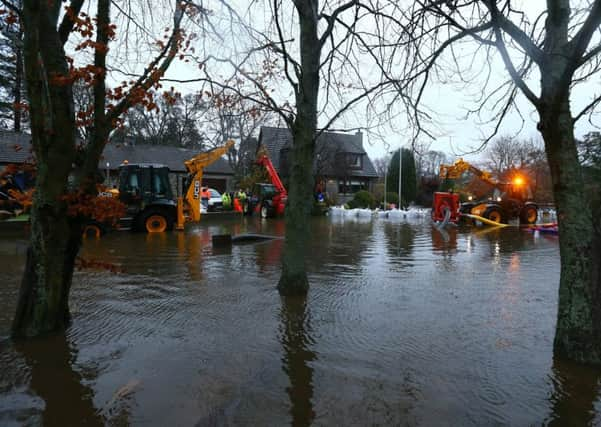Scots households face wait for flood damage claims


Insurance companies are under pressure this weekend to improve their response to flood-hit homes amid concerns over the difficulties some policyholders are experiencing in getting their insurance claims kick-started.
The extent of the flooding across the UK in December and January means some homeowners are still struggling to reach loss adjusters faced with huge numbers of properties to assess. Insurance claims for damage caused by the storms of the past few weeks could top £1.3 billion, the Association of British Insurers (ABI) said.
Advertisement
Hide AdAdvertisement
Hide AdBank of Scotland has so far received 130 flood-related claims from homeowners in areas including Ballater, Aboyne, Inverurie and Ellon. Many more are on the way and the average claims costs are likely to exceed previous flood events north of the Border, according to the bank.
The average cost of a claim for flood damage last year was more than £34,000 per incident, it said.
Tim Downes, senior claims manager at Bank of Scotland Insurance, said: “Early payments are being made to customers to help them replace damaged items such as furniture as soon as possible. Our personal claims consultants have also arranged suitable alternative accommodation for those who have had to leave their homes.”
But homeowners dealing with flood damage are getting inconsistent advice from some insurers, according to Paul Hendy, of the Scottish Flood Forum.
“There’s lot of conflicting information out there. People want insurers to start the process, tell them what to do and move on, but getting the right information is difficult and the advice is not always the best.”
Some properties are also being evaluated by loss adjusters who aren’t qualified to assess flooding cases, he added.
“So many places have been flooded that there are inevitable delays. The biggest problem is perhaps managing expectations,” said Hendy.
The latest floods could result in a spike in the number of insurance disputes taken to the Financial Ombudsman Service (Fos). Around half of the 3,000 complaints about buildings insurance between April and December 2015 related to damage caused by bad weather, said the Fos.
Advertisement
Hide AdAdvertisement
Hide AdFlood-related insurance complaints typically concern rejected claims, the time taken to arrange repairs and cases where the insurer has decided that the damage has been caused by “wear and tear” rather than flooding.
The biggest single problem with flood complaints is the time it can take to get the property habitable again.
“When it comes to events like the recent floods, insurers tend to be efficient and will arrange for many members of staff, loss adjusters and other experts to be available to resolve claims as quickly and practically as they can,” said a spokesperson for the Fos. “However, in some situations where damage is severe or many people are affected, it may take longer, or even up to a month.”
Those potentially facing a long wait include households in Aberdeenshire, where several rivers reached their highest level in decades in early January, and homes in Tayside and the Borders that were hit by Storm Frank last month.
The Scottish Government has announced £12 million of funding for flood-hit areas, with £1,500 grants made available to every home directly affected by flooding. Holyrood is now under pressure from Scottish Labour to review funding cuts for the Scottish Environment Protection Agency (Sepa) that were announced in December’s draft Budget.
Around one in 22 homes in Scotland are classed by Sepa as being at risk of flooding. The latest floods came three months before the introduction of a new UK scheme, named Flood Re, aimed at keeping premiums affordable for properties hit by or at risk of flooding.
It will replace a previous agreement between insurers and Westminster that guaranteed affordable cover for flood-risk homes in return for government investment in flood defences.
The scheme will add £10.50 to the average home insurance policy for all residential properties in the UK, regardless of whether they are at risk of flooding.
Advertisement
Hide AdAdvertisement
Hide AdHome insurance policies renewing before April are likely to see premiums increase following the latest floods, PwC has warned. Some homeowners have held off renewing their policies until the new arrangement takes effect in April, raising concerns that more homes than usual could be left temporarily without cover.
Home insurance with flood cover would become unaffordable or even unobtainable for about 5,000 Scottish households without the protection of deals such as Flood Re, according to the ABI.
Some properties are ineligible for Flood Re, however, including buy-to-let homes and properties built after 2009.
If you have insurance and your home has been affected by flooding, it’s important to tell your insurer as soon as you can, if you haven’t already done so. “The important thing to bear in mind is you should always get in touch with the business you have the direct business relationship with – your insurer,” said the Fos.
“If a contractor is causing problems or isn’t listening, it’s your insurer’s responsibility to sort things out. So let them know, and contact the ombudsman if that doesn’t work.”
Sepa flood alerts: http://floodline.sepa.org.uk/floodupdates/ or call Floodline on 0345 988 1188. Financial Ombudsman Service: http://www.financial-ombudsman.org.uk/ or call 0800 0234 567